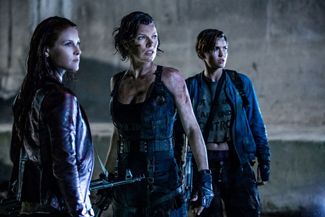|
|
Movie Review - Resident Evil: The Final ChapterBy Ben GruchowJanuary 31, 2017
I do not mean to insinuate that this film's problems stop at the communication of its cinematography. Terrence Malick wouldn't be able to drag this one over the line to a recommendation. The problems aren't intrinsic to its conception (this is a sentiment we'll elaborate on a bit later on. The movie is really left out to dry by a preponderance of amateur-hour stylistic and procedural flubs somewhat surprising to those familiar with the writer-director, Paul W.S. Anderson. This is the man behind Mortal Kombat, Alien vs. Predator, Event Horizon, and Pompeii: all films with common dramatic liabilities, but all with common visceral assets to help offset them, or at least make them relatively easy sits. I have no idea what happened with him here. The Last Chapter opens with its best sequence. This is a trait common to all of the Resident Evil films-save for the third one, which found its apotheosis mid-film, and the second, which has no good sequences. This one is a combined chase and face off in the husk of a ruined Washington D.C., between genetically-modified super-soldier Alice (Milla Jovovich, never better in the role, for what that's worth), and what appears to be a gigantic hybrid of land-dwelling crustacean and the flying piranhas from The Spawning. The sequence is still shot too haphazardly and cut way too frenetically, but there's a certain elemental binary focus to it missing from the rest of the film, and there's some standalone moments that provide an evocative chill (a shot of Alice from behind, looking across the Reflecting Pool at a pitted and scarred Washington Monument, is lovely in its construction and lighting and unsettling as a way to open the film). The “Previously on…” recap that precedes the title card is better still - finally giving us a motive for the Umbrella Corporation's homicidal business plan that's comprehensible, if not sensible. And the movie's digital and prosthetic effects are mostly convincing.
|

|
|
|

|
Friday, November 1, 2024
© 2024 Box Office Prophets, a division of One Of Us, Inc.


